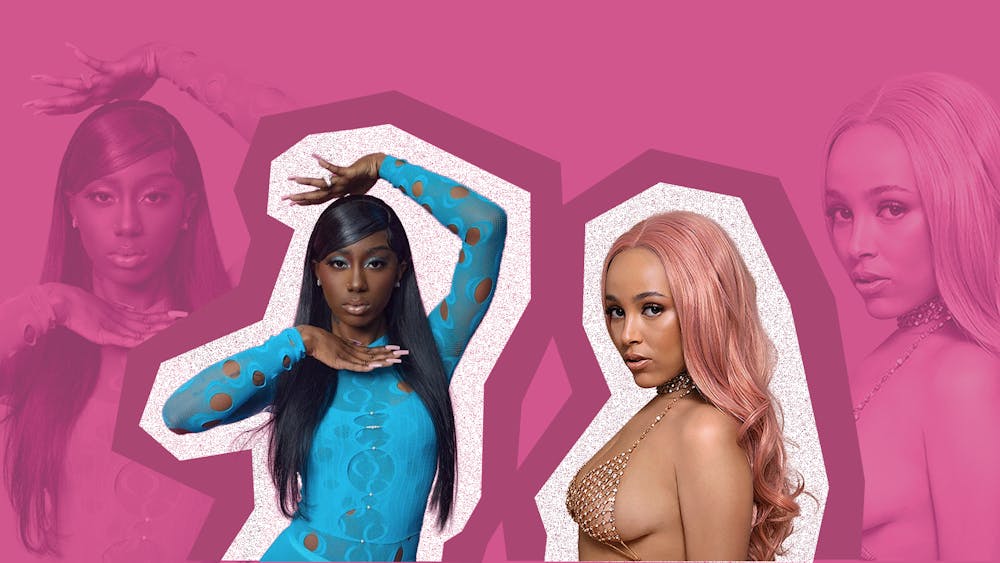There's no question that Black female rappers receive more criticism than male rappers of any race. Since the explosion of hip–hop and R&B in the 1980s, male artists and white male executives have dominated this sector of the music industry, leaving Black women as the underdogs of the rap scene. The student response to Alabama–based rapper Flo Milli as a headliner for Penn’s 2022 Spring Fling is a harsh reminder that there is much progress to be made in tackling colorism and misogyny in the rap industry.
On April 9, Penn’s Social Planning and Events Committee (SPEC) released the lineup for Spring Fling, a community–coveted social event in our own backyard featuring artists students are dying to see live. This year features Milli and the electronic music group Cheat Codes. In the past, dozens of notable musicians have taken the Penn Park stage, including Chance The Rapper, Passion Pit, and Janelle Monáe.
Despite excitement at the “Revival of the Fling,” not all Penn students were satisfied with this year’s headliners. On the same day that SPEC announced the Spring Fling headliners, the admin of the Barstool UPenn Instagram account turned to the platform to deliver a controversial message. The account posted a slideshow of two screenshots of Google searches—one search reads, “who is flo milli?” and the other says, “how to sell spring fling tickets.”
The caption of this post is what transitions an innocent opinion into a statement of prejudice: “Well maybe next year we’ll get @jackharlow.” Jack Harlow, the up–and–coming Louisville–based rapper, is famous for his freestyle talent and swarm of Twitter suitors, and was recently named the headliner of Temple University’s OWLCHELLA. Harlow is a well–versed talent, but he's also a white man.
This is far from the first time a Black, especially darker–skinned, female rapper has been deprecated for her artistry. When the BET Hip Hop Awards released their nominations for the 2021 Best Female Hip Hop artists category, only one dark–skinned woman was nominated: Megan Thee Stallion. Among the group were mostly light–skinned female rappers, including Cardi B and Coi Leray. Colorism runs rampant in the music industry, leading Black women to believe that lighter skin equates to success.
In addition to colorism in the music industry, female rappers are taken far less seriously by rap fans. The earliest Black female rap influences, such as Ms. Lauryn Hill, Queen Latifah, and Missy Elliot, were often produced by male–led agencies. Contemporary Black female acts like Nicki Minaj and Beyoncé began to normalize “provocative” lyricism with themes of sex, partying, and drugs. This hasn’t always been well received, shielding female artists from empowerment and comfortable creative outlets.
The Washington Post shames the public's reception of sex talk in female rap, claiming that when male artists rap about the same vulgar topics, their work is praised and acclaimed. For example, when Megan Thee Stallion and Cardi B collaborated on the 2020 smash hit “WAP,” an acronym for “Wet–Ass Pussy,” the song quickly became mainstream news—and not for its musical value.
In a since–deleted tweet, 2020 Republican congressional candidate DeAnna Lorraine writes, “Cardi B & Megan Thee Stallion just set the entire female gender back by 100 years with their disgusting & vile ‘WAP’ song.” Lorraine’s internalized misogyny is just a glimpse into the female rapper experience. Only in an alternate music universe will women be allowed to rap about sex without being berated by faceless media figures.
In terms of our Spring Fling, there's much to celebrate about Milli. At just 22 years old, she's already an esteemed rap talent. She was signed by RCA Records and released her debut EP Ho, why is you here ?, and she also earned a nomination for the 2020 BET Hip Hop Awards Best New Artist category—all in the span of two years. All this after Flo Milli first gained the attention of the rap world after releasing “Beef FloMix”—her spin on Playboi Carti and Ethereal’s “Beef”—on Instagram in 2018.
Milli has been performing and writing lyrics since she was 9 years old, participating in church choirs and rapping with her friends at school. “I think my younger self would definitely be proud of me right now because I’ve reached a lot of my goals that I have for myself as a kid,” Milli says to Billboard.
As we witness the rise of more Black female artists in the music industry, it’s essential to acknowledge the experience of the Megan Thee Stallions and Flo Millis of the world. Despite their misrepresentation and underappreciation, Black women continue to break the highest and thickest glass ceilings in the rap game.







